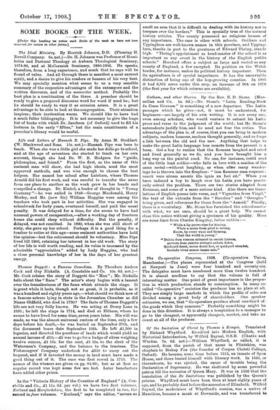Gotham, and other Stories. By the Rev. E. D. Stone.
(Mao-. millan and Co. is. 6d.)—Mr. Stone's "Latin Reading-Book In Usum Tironum" is something of a new departure. The Latin passages which he gives—not, it must be understood, for. beginners—are largely of his own writing. It is not every one. even among scholars, who would venture to submit his Latin prose and verse to the judgment of the world; but Mr. Stone's, antecedents justify him, and he need not fear the critics. The advantage of the plan is, of coarse, that you can bring in modern. -subjects, modern humour, modern thought generally, and so forge a link between the old and the new. Anything that helps to make the great Latin language less remote from the present is a boon. Get a boy to realise that the Romans laughed and cried and lived generally as we do, and you have brought • him a. long way on the painful road. No one, for instance, could read of the little lead soldier—who falls in love with a maiden of the same metal—without laughing, as when after ninny wander- ings he is thrown into the fireplace: "lam flammae eum coquunt: nescit vero utrum amoris ille ignis an foci sit." When you have induced a boy to laugh over his Latin you have practi- cally solved the problem. There are two stories adapted from Erasmus, and some of a more serious kind. Also there are trans- lations of English poems into verse, and "Vignettes from Virgil," the text of the extracts from the " Bucolics " and "Georgics" being given, and references for those from the " A.eneid."
there is a vocabulary. Mr. Stone has furnished the schoolmaster with what, we are sure, should be a great help. We cannot close this notice without giving a specimen of his quality. Here are some lines from Charles Kingsley, latine reddita :— " While a lip grows ripe for kissing,
While a moan from grief is wrung, Know, by every want and blessing, That the world is young."
" Dulcia dam roseum witeeeet in °soula labrum,
pectora dum gemitn stringet anbela dolor,
Quidquid deest, tmum docet hoc, at quidquid abandat,
fecund° vivax semen Meese solo."














































 Previous page
Previous page